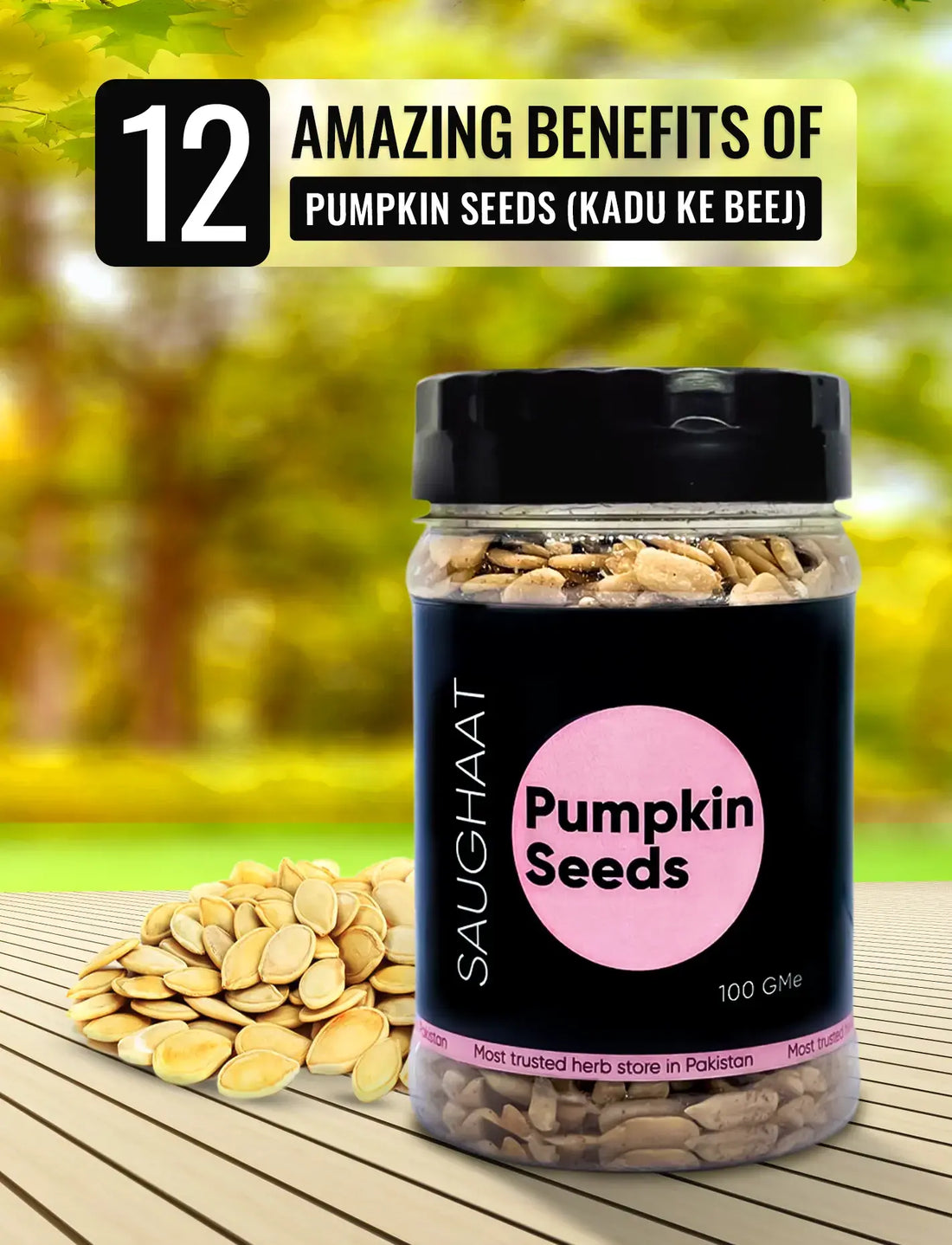
12 Amazing Benefits of Pumpkin Seeds (Kadu ke Beej)
Share
Pumpkin seeds, also known as pepitas, are the edible seeds that come from pumpkins, a type of squash. These seeds are flat, oval-shaped, and typically have a greenish-white outer shell, which is often removed before consumption. These seeds have a mild, nutty flavor and are enjoyed for their taste as well as their nutritional value.

Nutritional Profile of Pumpkin Seeds
These seeds, also known as pepitas, have an impressive nutrient profile, making them a highly nutritious addition to your diet. Here's a breakdown of the key nutrients found in these seeds:
Protein: These seeds are a good source of plant-based protein. A 1-ounce (28-gram) serving provides approximately 5 grams of protein.
Healthy Fats: They are rich in healthy fats, including monounsaturated and polyunsaturated fats. These fats are heart-healthy and contribute to the nutty flavor and texture of these seeds.
Intake of these seeds provides a feeling of fullness. A 1-ounce serving typically provides around 1.7 grams of fiber.
Vitamins:
- Vitamin K: These seeds are a good source of vitamin K, which is important for blood clotting and bone health.
- Vitamin E: They contain vitamin E, an antioxidant that helps protect cells from damage caused by free radicals.
Minerals:
- Magnesium: These seeds are one of the best plant-based sources of magnesium. Magnesium plays a crucial role in various bodily functions, including muscle and nerve function, bone health, and blood sugar regulation.
- Zinc: They are also rich in zinc, which is essential for immune function, wound healing, and skin health.
- Potassium: These seeds provide a modest amount of potassium, which helps maintain healthy blood pressure and supports nerve and muscle function.
- Iron: They contain iron, although the iron is not as easily absorbed as iron from animal sources.
Antioxidants: These seeds are a good source of antioxidants, including carotenoids and vitamin E. These antioxidants help protect cells from oxidative damage.
General Benefits
Pumpkin Seeds in Pakistan are known as Kadu ke beej. Here are some of the key benefits of incorporating these seeds into your diet:
- Heart Health: These seeds are rich in heart-healthy fats, including monounsaturated and polyunsaturated fats. They can help lower bad cholesterol levels (LDL) and reduce the risk of heart disease.
- Rich in Antioxidants: These seeds contain antioxidants like carotenoids and vitamin E, which help protect cells from oxidative damage caused by free radicals. Antioxidants are essential for overall health and may reduce the risk of chronic diseases.
- Mineral-Rich: They are an excellent source of essential minerals like magnesium, potassium, and zinc. Magnesium supports muscle and nerve function, bone health, and blood sugar regulation.
- Plant-Based Protein: These seeds are a valuable source of plant-based protein, making them an excellent choice for vegetarians and vegans. Protein is essential for muscle maintenance, repair, and overall body function.
- Fiber Content: The dietary fiber in these seeds aids in digestion, promotes a feeling of fullness, and supports regular bowel movements. A diet high in fiber can also help manage weight and reduce the risk of constipation.
- Bone Health: The combination of minerals found in these seeds, including magnesium, phosphorus, and zinc, contributes to bone health. These minerals are essential for maintaining strong and healthy bones.
- Improved Sleep: These seeds contain the amino acid tryptophan, which is involved in the production of serotonin and melatonin. These neurotransmitters play a role in regulating mood and sleep patterns, in this way Pumpkin Seeds benefits individuals to get better sleep quality.
- Prostate Health: Some studies suggest that the compounds in these seeds may support prostate health and reduce the risk of benign prostatic hyperplasia (BPH) in men.
- Immune Support: The zinc content in these seeds is known to boost immune function, helping the body fight off infections and illnesses.
- Mood Regulation: The presence of magnesium in these seeds may contribute to mood stabilization and the reduction of symptoms associated with anxiety and depression.
- Skin Health: Presence of antioxidants in Pumpkin Seeds benefits for skin, particularly vitamin E contributes to healthy skin by protecting it from damage caused by UV radiation and oxidative stress.
- Weight Management: The combination of protein, fiber, and healthy fats in these seeds can promote a feeling of fullness and aid in weight management by reducing overall calorie intake.

Recipes to Consume Kadu ke Beej Powder
Pumpkin Seeds powder is a versatile ingredient that can be used in various ways to add flavor and nutrition to your meals and snacks. Here are several ways to use pumpkin seed powder in your culinary creations:
- Smoothies and Shakes: Add a spoonful of pumpkin seed powder to your favorite smoothie or protein shake for an extra boost of nutrition. It pairs well with fruits like banana, berries, and mango.
- Oatmeal and Cereal: Mix pumpkin seed powder into your morning oatmeal or cold cereal for added protein, healthy fats, and a nutty flavor. You can also sprinkle it on top as a garnish.
- Baking: Incorporate pumpkin seed powder into baked goods like muffins, pancakes, waffles, or bread. It can enhance the nutritional content of your recipes while adding a pleasant nuttiness.
- Yogurt and Parfaits: Stir pumpkin seed powder into yogurt to create a creamy and nutritious snack. Layer it with fruits and honey for a delicious parfait.
- Salads: Sprinkle pumpkin seed powder on top of salads as a nutritious and crunchy topping. It complements both leafy green salads and grain-based salads.
Side Effects
Pumpkin Seeds side effects are generally none to minimal when consumed in moderation as part of a balanced diet. However, some individuals may experience mild side effects, particularly if consumed in excessive amounts.
Conclusion
Pumpkin Seeds in Urdu Kadu ke beej offers plethora of benefits. It's important to note that these seeds can be consumed as a snack, added to salads, yogurt, oatmeal, or baked goods, and even used as a garnish for various dishes. Incorporating them into your diet can provide these health benefits while adding a delicious and nutritious element to your meals.
